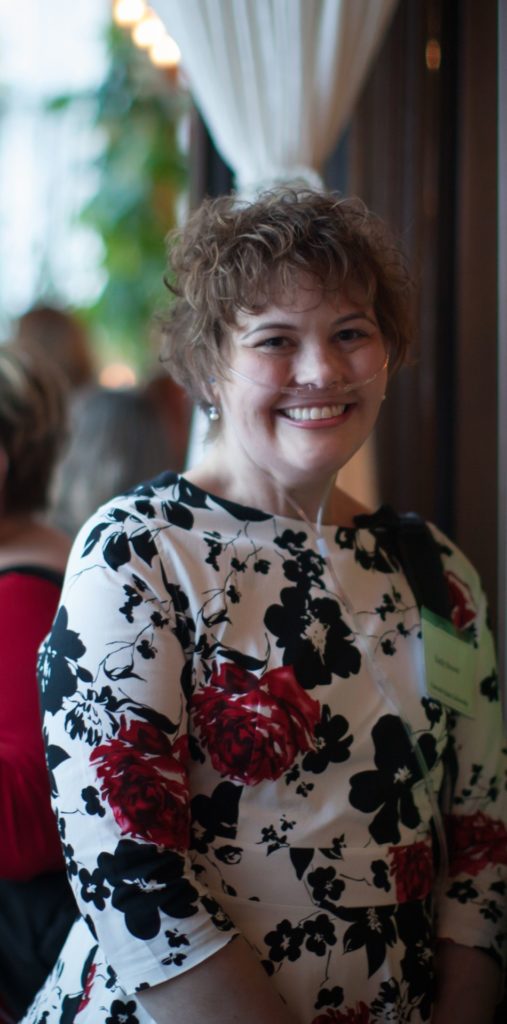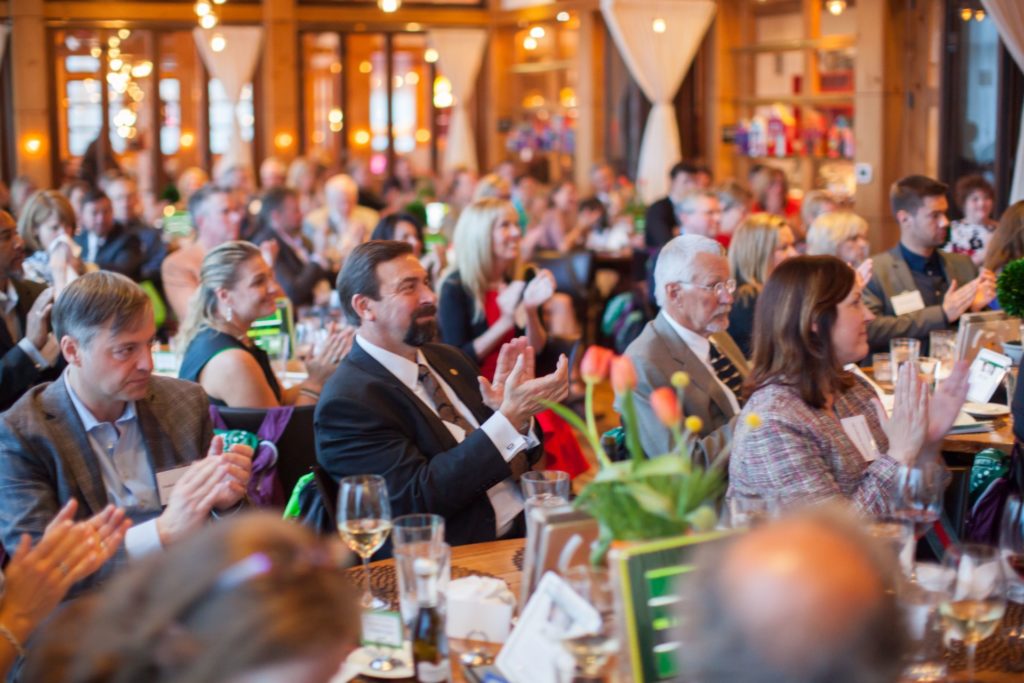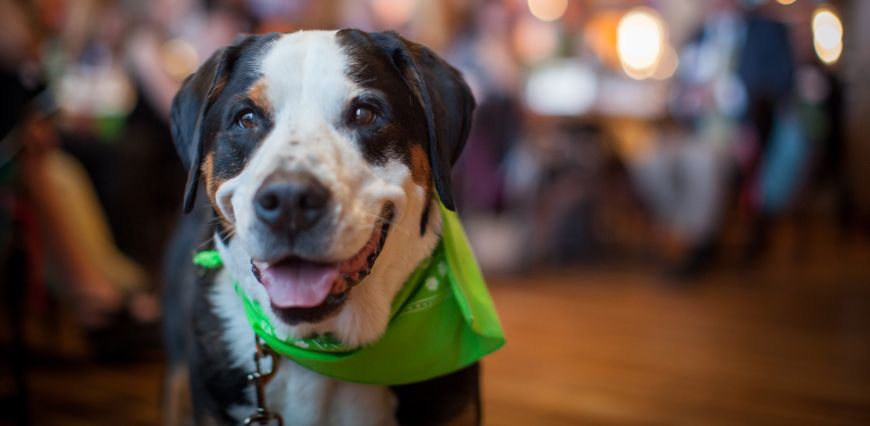Friends of Colorado State University’s Flint Animal Cancer Center recently gathered for the fifth annual One Cure fund-raising dinner and fulfilled goals in support of clinical trials for dogs with naturally occurring tumors – a type of research that aims to help cure cancer in both pets and people.

The Flint Animal Cancer Center is the world’s largest center focused on veterinary oncology, tallying about 6,000 patient visits and 3,000 consultations annually. Many of its patients are enrolled in Comparative Oncology Clinical Trials, which deliver and evaluate cancer treatments still under development; the knowledge gained is translated from veterinary to human medicine in an effort to improve cancer treatment and outcomes for all species.
Comparative oncology is a hallmark of the CSU cancer center, which opened in 2002. The focus is possible because of similarities in the tumors of animals and people, and because of close collaboration between veterinary oncologists and those working in human medicine.
Comparative research speeds process
“The field of comparative oncology research is gaining recognition for its potential to expedite the drug discovery process through collaborative projects,” said Dr. Christine Hardy, who oversees operations for the Flint Animal Cancer Center.
“Thanks to One Cure and the Anschutz Foundation, our clinical trials program is fully staffed and poised to double the number of studies we conduct in an effort to help all cancer patients – pets and people alike,” Hardy said. “We will continue to build on our work by creating stronger working relationships with human oncology researchers and developing a more integrated approach to cancer research.”
The One Cure initiative seeks to build on momentum created last summer with a first-of-its-kind workshop, held in Washington, D.C., and hosted by the National Cancer Policy Forum, part of the Institute of Medicine. Leading cancer experts attended to discuss collaborations and to set a unified vision for translational cancer research.
“We are diligently working to achieve the goals set after the IOM workshop in June 2015,” said Dr. Rodney Page, director of the Flint Animal Cancer Center. “That includes raising public awareness about the value of comparative oncology. One Cure is a vital resource in that effort.”
Outstanding support
The One Cure dinner, on April 23 at Chinook Tavern in Greenwood Village, was sponsored by Rick and Melissa Westerman. The Westermans are clients of the Flint Animal Cancer Center whose Greater Swiss Mountain Dogs, Heidi and Greta, are cancer survivors.
Other supporters and organizations represented at the One Cure dinner included: the Kenneth and Myra Monfort Charitable Foundation; June Harper of Denver, Colo.; University of Colorado Cancer Center; and C.H. Robinson Worldwide.
Special guests

Guests at the event included Dr. Tony Frank, CSU president and system chancellor, Joe Blake, CSU chancellor emeritus, and keynote speaker Dr. Len Lichtenfeld, deputy chief medical officer of the American Cancer Society.
Lichtenfeld, also a speaker at the Institute of Medicine workshop, described his family’s 11-year-old golden retriever, Lily, who died with lymphoma. Comparative oncology is a powerful weapon in the war on cancer, he said.
“We live in an incredible moment in time,” Lichtenfeld said. “We have an opportunity to make a real difference. It’s taken us 40 years, but we have the resources to make it happen.”
Clinical trials offer hope
Honored guest speaker William Lukes, a Flint Animal Cancer Center client and supporter, shared the story of Bogey, his much-loved Border collie mix and an agility champion whose rare cancer was treated with experimental radiation therapy. The therapy helped extend Bogey’s life by 18 months, and the information gained from his treatment helped several other canine patients with the same type of cancer.
Lukes also described his recent diagnosis with esophageal cancer. His only hope, Lukes said, is a clinical trial.
“I can now tell you from a new, unwanted, and very personal perspective that hope is truly as powerful a tool as any chemo drug or protocol,” Lukes said. “What you are doing here tonight, and what each of you brings to cancer patients throughout the year – with your leadership and involvement, your research, and your persistent inquiries into how we can do this better – is hope.”
The Comparative Oncology Clinical Trials Program
This program is part of the Comparative Oncology Trials Consortium, a network of 22 academic comparative oncology centers, centrally managed by the NIH-NCI-Center for Cancer Research’s Comparative Oncology Program, which designs and executes clinical trials in dogs with naturally occurring cancer to assess new therapies.
The CSU-FACC is a longtime collaborator with University of Colorado Cancer Center, led by Dr. Dan Theodorescu. The teams share research data and insights gained from clinical trials to improve cancer treatments for pets and people.
Recently, the leadership from both centers appeared together before the Colorado State Public Health Care and Human Services Committee to raise awareness among legislators of the importance of collaboration in cancer research. Read about it on Colorado Cancer Blogs.

Above: Heidi, a patient of CSU’s Flint Animal Cancer Center, is a cancer survivor owned by Rick and Melissa Westerman, who hosted the One Cure dinner. Photo by Deanna Hurt/StinkDog Photos
About One Cure
Launched in 2009, One Cure is an initiative founded in the principle that cancer affects all creatures and that treatment breakthroughs come through collaboration between scientists and doctors working with both people and animals.
To learn more or to donate, visit the CSU Animal Cancer Center website.